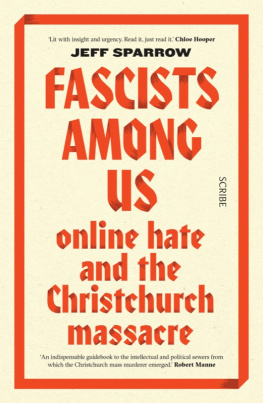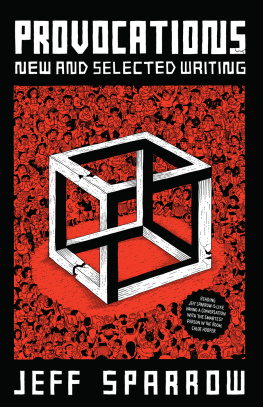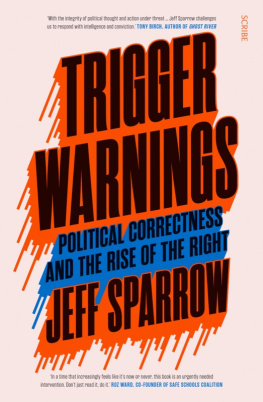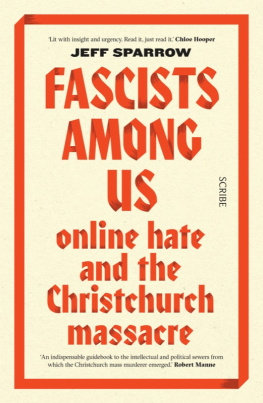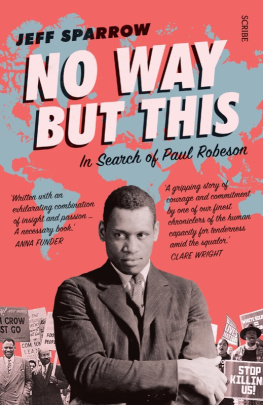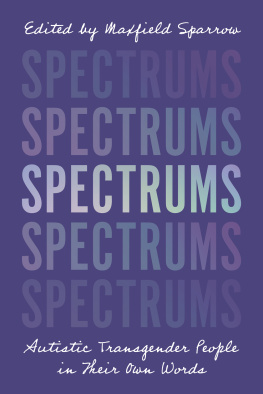Jeff Sparrow - Killing: Misadventures In Violence
Here you can read online Jeff Sparrow - Killing: Misadventures In Violence full text of the book (entire story) in english for free. Download pdf and epub, get meaning, cover and reviews about this ebook. year: 2009, publisher: Melbourne University Publishing, genre: Detective and thriller. Description of the work, (preface) as well as reviews are available. Best literature library LitArk.com created for fans of good reading and offers a wide selection of genres:
Romance novel
Science fiction
Adventure
Detective
Science
History
Home and family
Prose
Art
Politics
Computer
Non-fiction
Religion
Business
Children
Humor
Choose a favorite category and find really read worthwhile books. Enjoy immersion in the world of imagination, feel the emotions of the characters or learn something new for yourself, make an fascinating discovery.

- Book:Killing: Misadventures In Violence
- Author:
- Publisher:Melbourne University Publishing
- Genre:
- Year:2009
- Rating:5 / 5
- Favourites:Add to favourites
- Your mark:
- 100
- 1
- 2
- 3
- 4
- 5
Killing: Misadventures In Violence: summary, description and annotation
We offer to read an annotation, description, summary or preface (depends on what the author of the book "Killing: Misadventures In Violence" wrote himself). If you haven't found the necessary information about the book — write in the comments, we will try to find it.
Killing: Misadventures In Violence — read online for free the complete book (whole text) full work
Below is the text of the book, divided by pages. System saving the place of the last page read, allows you to conveniently read the book "Killing: Misadventures In Violence" online for free, without having to search again every time where you left off. Put a bookmark, and you can go to the page where you finished reading at any time.
Font size:
Interval:
Bookmark:
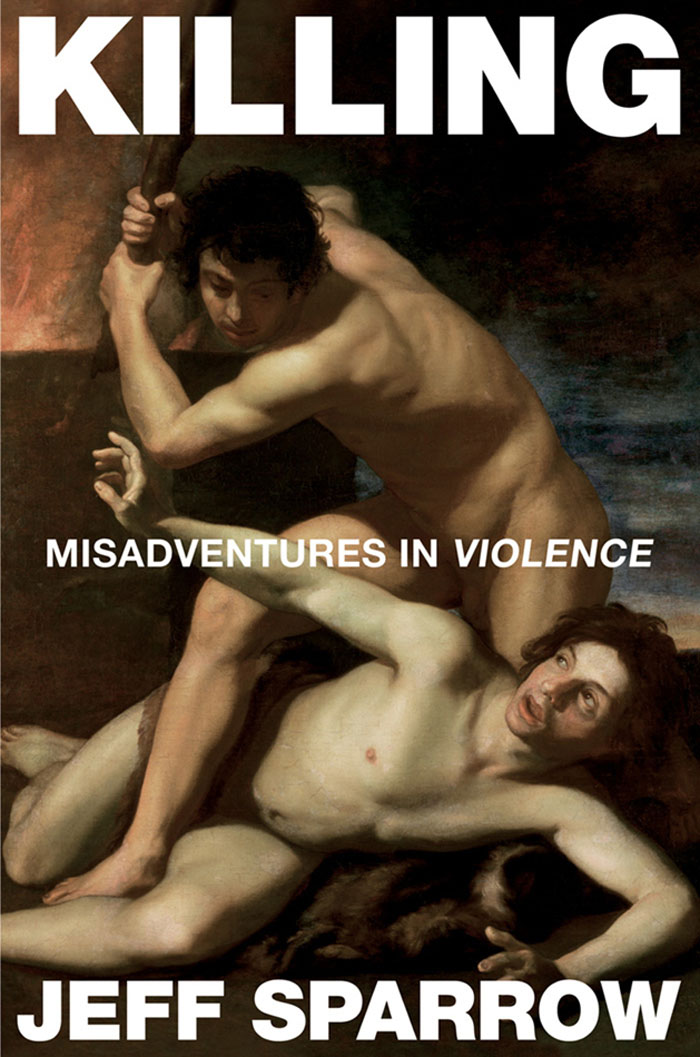
Misadventures in Violence
JEFF SPARROW

[T]he drift of modern history domesticates the fantastic and normalises the unspeakable. And the catastrophe that begins it is the Great War.
Paul Fussell
Life is beautiful
Leon Trotsky
Some material in Killing has appeared, in different forms, in the Age, the Sydney Morning Herald and Overland.
Of the many people who assisted with this book, I thank in particular Kalinda Ashton, David Brophy, Cinzia Cavallaro, Sophie Cunningham, Rjurik Davidson, Lucy Davison, Gill Davy, David Hudson, Foong Ling Kong, Andrew Macrae, Gerard Morel, Sean Scalmer, Alex Skutenko, Jill Sparrow, Rebecca Suter and Katherine Wilson.
The names and locations of some interviewees have been altered. I would like to thank everyone who agreed to talk about a difficult and often personal subject. The conclusions drawn in the book are, of course, mine and not theirs.
The head lay in a red velvet display case. The eyes had rotted away, as had the lips, but the ears remained and tufts of moustache clung to the black, leathery skin. A 3-centimetre impact hole gaped in the crown, with a matching perforation punched roughly through the bone on the other side.
The head was in the possession of the police in Echuca, a country town in Victoria. Not surprisingly, they wanted rid of it. They telephoned the Turkish sub-branch of the Returned and Services League.
Weve got one Turkish head, a policeman told Ramazan Altintas, the sub-branch president. What do we do? He explained how a local resident, tidying up after a death in the family, came across the grisly artefact, a souvenir, supposedly, from his grandfathers service at Gallipoli. The man brought it to the station. Would Altintas collect it?
The police probably hoped Altintas would make the problem disappear. Severed heads in display cases were not a normal responsibility of country policing, and Altintas seemed an appropriate solution. He was a Turkish community leader in an organisation that commemorated the war. He would know what to do. With luck, hed take the horrible thing far, far away.
Altintas, however, had other plans. He brought the case back to his office in South Melbourne and he issued a press release. The headline read, SCANDAL! The next day, pictures of the head from Gallipoli featured on the front pages of newspapers across the country. I read the articles over breakfast, without, initially, any interest beyond a certain grisly curiosity. It was May 2002. The invasion of Afghanistan was underway, and speculation was already mounting about an attack on Iraq. The twenty-first century promised so many wars of its own that worrying about the human debris of a battle waged nearly a century ago seemed almost indulgent.
Three years passed. In late 2005, a minor controversy erupted about nowthatsfuckedup.com, a porn website specialising in user-generated content. Specifically, it relied on images provided by readers, allegedly of their girlfriends or wives. Many of nowthatsfuckedup.coms patrons served in the US military, and some complained about difficulties using credit cards from the countries in which they were posted. To encourage their custom, the site owner, one Chris Wilson, offered a special deal: soldiers in Iraq and Afghanistan could access porn freely on the condition they contributed photos from their tours of duty.
Wilson didnt specify any particular kind of photos, and plenty of soldiers simply emailed innocuous snaps of burly young men clowning for the camera or in mock-heroic poses with rifles and helmets. Others sent something quite different. Pictures of corpses arrived by email: horrific photographs of eviscerated torsos, cadavers charred beyond recognition. Sometimes, the dead seemed to be Iraqi soldiers or insurgents. Sometimes, they were civilians. Sometimes, they were just pieces of raw, red meat, sitting wetly in ruined cars or amid the bricks of toppled buildings. Indeed, nowthatsfuckedup.com accumulated so many grisly images that Wilson developed a specific section for his horror show, pages at which digital rubberneckers could scroll past example after example of the dreadful fragility of the human form: a severed head floating in a bowl of blood; an arm; a child with its face torn off.
Some soldiers captioned their work. The labels were often pragmatic, offering some pictures in exchange for access or, more bluntly, dead men for entry. Others made jokes. Name the body part, invited one soldier, underneath an image of a glistening lump. Another listed his photo as showing an Iraqi driver and passenger that tried to run a checkpoint and complained the bad thing about shooting them is that we have to clean it up. The viewers, by and large, responded with enthusiasm. Awesome, said one. Hey, soldier buds, wrote another, post some fresh kills for us!
Eventually, the media learnt of the site and, with the corpses-for-porn deal in the news, the sites URL flashed around the net. Yes, I logged on, too. With the mangled corpses scrolling across my screen, I found myself, quite unexpectedly, remembering the head from Gallipoli.
The scarifying experience of the trenches introduced a new vocabulary for remembrance into English. Prior to the Great War, one spoke of keepsakes. Soldiers posted in France came back with the word souvenir to describe the talismans they collected. In Iraq in 2005, US troops felt less obliged to hoard physical objects. They enjoyed state-of-the-art Internet access, even at the front line. Digital cameras and video recorders were everywhere in Iraq, far smaller and more portable than in previous wars. These soldiers could capture a scene (a desert landscape, the aftermath of a car bombing, a lacerated corpse) on a tiny electronic device and instantly transmit the digital souvenir anywhere around the world. Back in 1915, soldiers at Gallipoli lacked broadband and digicams. But the impulse was the same. Unable to take a photo, someone kept a head: a permanent representation of experienced violence.
At the time of the nowthatsfuckedup.com controversy, I was working on a PhD. Whatever the story of the Echuca head, it definitely constituted a distraction of the kind you were supposed to avoid, and I successfully kept it at bay for several months. But that didnt mean Id forgotten. In early 2006, with the thesis temporarily stalled, I phoned the Returned and Services League Turkish sub-branch and asked to see Ramazan Altintas.
It was still curiosity as much as anything else. The War on Terror, Dick Cheney had said, would run for a generationfifty years, Peter Costello suggested. Battles would rage all over the world, not just in Iraq and Afghanistan, but on fronts yet to be determined. There was, it seemed, plenty of violence still to come. In 2006 we were already at war. Yet Iraq and Afghanistan were thousands of kilometres away and directly involved only a handful of Australians, most of whom were soldiers in elite units. The wars played like scratchy old horror movies projected onto a screen: disturbing, yes, but ultimately just shadows flickering on the surface of reality. Each fresh atrocity came and each fresh atrocity went, and there was no trace of its passage. That Friday, the day I phoned Altintass office, six off-duty Iraqi soldiers had been massacred outside a restaurant in northern Iraq. A few days earlier, unidentified fighters had slit the throats of two teachers in front of their Shiite students, and a car bomb killed seven bystanders in Suleikh in eastern Baghdad. And so on and so on and so on. We became acclimatised so easily.
Font size:
Interval:
Bookmark:
Similar books «Killing: Misadventures In Violence»
Look at similar books to Killing: Misadventures In Violence. We have selected literature similar in name and meaning in the hope of providing readers with more options to find new, interesting, not yet read works.
Discussion, reviews of the book Killing: Misadventures In Violence and just readers' own opinions. Leave your comments, write what you think about the work, its meaning or the main characters. Specify what exactly you liked and what you didn't like, and why you think so.

